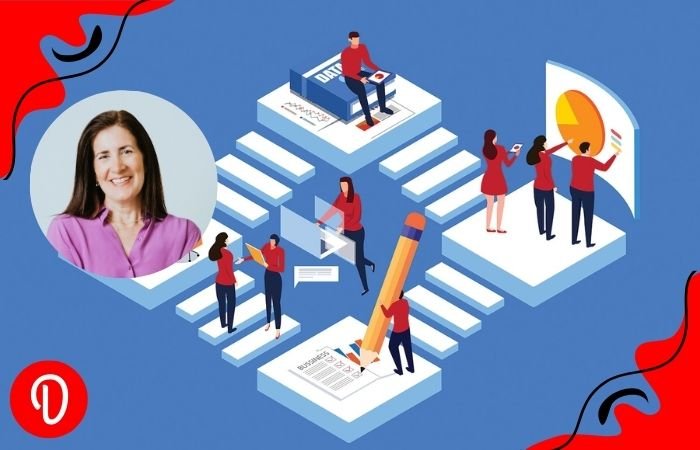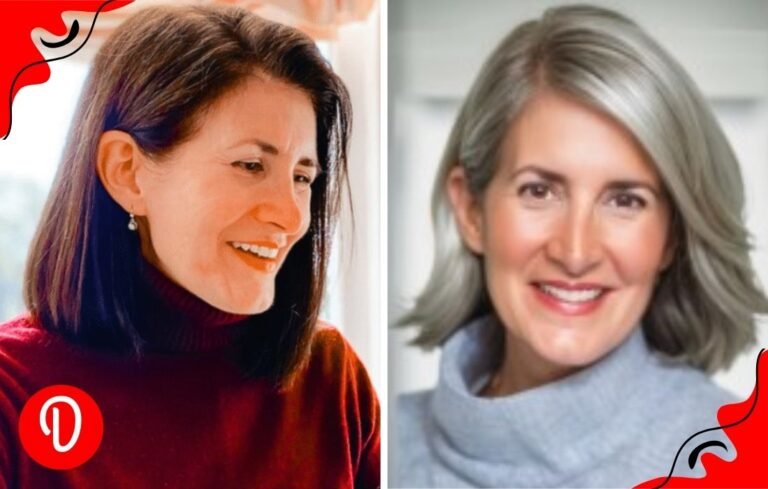Elizabeth Sandler is a name that resonates strongly in the world of finance and corporate leadership. With a remarkable career spanning 25 years in financial services, she rose to senior leadership roles at some of the world’s most powerful institutions, including Blackstone and Deutsche Bank. Today, she continues to influence the business world as a board member, mentor, and advocate for meaningful workplace change. Beyond her professional accomplishments, Sandler is deeply committed to closing the gender leadership gap and creating more human-centered workplaces, making her story not only one of personal success but also of wider impact. Let’s dive into her journey to see how her career, values, and leadership continue to inspire others.
Quick Bio: Elizabeth Sandler at a Glance
-
Full Name: Elizabeth Sandler
-
Career: 25 years in Financial Services
-
Key Roles: Managing Director and Divisional COO at Blackstone and Deutsche Bank
-
Current Boards: Franklin Square Capital (NYSE:FSK), essensys (LON:ESYS), The Wharton School, Scholars of Finance
-
Education: The Wharton School, University of Pennsylvania
-
Focus Areas: Gender Leadership Gap, Workplace Culture, Ethical Leadership
-
Professional Recognition: Respected voice in finance and corporate governance
-
Advocacy: Promotes Women in Leadership and Human-Centered Workplaces
-
Legacy: Building inclusive workplaces and mentoring future leaders
Early Life and Education
The foundation of Elizabeth Sandler’s career begins with education and early influences that shaped her approach to leadership. While much of her early life remains private, it is known that her academic journey took her to The Wharton School at the University of Pennsylvania, one of the most prestigious business schools in the world. At Wharton, she developed the analytical skills and strategic mindset that would later serve her well in high-pressure executive environments. Her connection to the school did not end with graduation; she has remained actively involved, eventually serving on its Board, a testament to her enduring belief in education and leadership development.
People Also Read: Who Is Pamela Frank? Exploring the Life and Career of the Renowned Violinist
Building a Career in Financial Services
Elizabeth Sandler’s professional journey spans more than two decades, during which she became a respected leader in financial services. She entered the industry at a time when leadership roles for women were limited, yet she quickly stood out for her ability to navigate complex business environments. Over 25 years, she proved herself in roles that demanded both operational expertise and visionary leadership. Her work was not just about advancing her own career but about reshaping financial institutions to be more innovative, inclusive, and resilient.
Leadership at Deutsche Bank
One of the most defining chapters of Elizabeth Sandler’s career was her tenure at Deutsche Bank. She served as a Managing Director and Divisional COO, positions that placed her at the heart of the bank’s global operations. In these roles, she was responsible for overseeing critical business functions, ensuring operational efficiency, and driving strategic initiatives. At Deutsche Bank, she earned a reputation for her steady leadership and ability to balance large-scale organizational needs with human-centered management. Her leadership during this period highlights her ability to thrive in environments where precision, responsibility, and foresight were essential.
Executive Role at Blackstone
After her time at Deutsche Bank, Elizabeth Sandler took on a senior leadership role at Blackstone, one of the world’s leading investment management firms. As Managing Director and Divisional COO, she was responsible for overseeing key areas of the firm’s operations. Working at Blackstone allowed her to apply her financial expertise on a global scale, supporting one of the most influential investment firms in the industry. Her leadership here was marked by a commitment to operational excellence and organizational culture, showing once again how she combined technical expertise with people-focused management.
Transition from Corporate Career to Board Leadership

After an accomplished 25-year corporate career, Elizabeth Sandler transitioned from executive roles to governance and board leadership. This move was not a step back but rather a natural evolution of her career. By stepping into board positions, she shifted her focus from managing day-to-day operations to guiding organizations at the highest level. This stage of her professional life reflects both her experience and her desire to continue influencing industries from a broader perspective. It also gave her the opportunity to support organizations whose missions align with her values of growth, ethics, and leadership.
Current Board Memberships and Leadership Roles
Today, Elizabeth Sandler sits on several prestigious boards. She serves as a board member of Franklin Square Capital (NYSE:FSK), a leading business development company. She is also on the board of essensys (LON:ESYS), a technology firm providing digital infrastructure for flexible workspaces. Beyond the corporate sector, she contributes to academia and nonprofit work as a board member of The Wharton School and Scholars of Finance, a 501(c)(3) organization that supports values-driven leadership among young people in finance. Each of these roles reflects her diverse expertise and her commitment to shaping industries in ways that prioritize long-term value, integrity, and inclusivity.
Advocacy for Women in Leadership
One of Elizabeth Sandler’s greatest passions is addressing the gender leadership gap. Having built her career in a male-dominated industry, she understands firsthand the barriers that women face in rising to senior roles. Today, she uses her voice and influence to advocate for greater representation of women in leadership across industries. Her advocacy is not just about numbers; it is about ensuring women have equal access to opportunities, mentorship, and support to thrive in executive positions. Sandler’s work in this area resonates with broader movements pushing for gender equality in corporate leadership.
Humanizing the Workplace
Elizabeth Sandler also champions the idea of humanizing workplaces. She believes that organizations should not only focus on financial performance but also on creating environments where people feel valued, respected, and supported. This philosophy challenges outdated corporate cultures that prioritize profits over people. Sandler’s perspective on workplace culture aligns with a growing recognition that human-centered leadership is essential for long-term success. By promoting healthier workplaces, she is contributing to a shift in how organizations think about leadership, culture, and employee wellbeing.
Influence on the Next Generation of Leaders
Through her work with Scholars of Finance and her continued involvement with The Wharton School, Elizabeth Sandler invests in the next generation of leaders. She emphasizes ethics, values, and responsibility in leadership—qualities she believes are critical in today’s fast-changing world. By mentoring and guiding young professionals, she is shaping leaders who will not only succeed in business but also bring integrity and compassion to their roles. This focus ensures that her influence extends far beyond her own career and continues to inspire future generations.
Recognition and Professional Impact
Elizabeth Sandler’s impact on financial services and leadership has been widely recognized. Her work has left a lasting mark on the institutions she served and the leaders she has mentored. Whether through her operational leadership at Deutsche Bank and Blackstone or her guidance on corporate boards, she has consistently contributed to the advancement of ethical, inclusive, and effective leadership. Her career serves as an example of what is possible when expertise, integrity, and purpose come together.
Personal Philosophy and Values
At the heart of Elizabeth Sandler’s professional and personal life is a commitment to values-driven leadership. She believes in integrity, inclusivity, and the importance of impact beyond profits. These values guide her decisions, whether in corporate roles, on boards, or in her advocacy work. Her personal philosophy demonstrates that true leadership is about more than titles—it is about shaping systems, empowering people, and leaving a meaningful legacy.
Conclusion: Why Elizabeth Sandler’s Work Matters
Elizabeth Sandler’s story is one of resilience, leadership, and purpose. From her years as an executive at some of the world’s most powerful financial institutions to her current roles as a board leader and advocate, she has consistently demonstrated the power of values-driven leadership. Her efforts to close the gender leadership gap and humanize workplaces go beyond individual success—they reflect a commitment to reshaping industries for the better. For anyone interested in finance, leadership, or the future of work, Elizabeth Sandler offers a compelling example of how one leader can make a lasting impact.
FAQs About Elizabeth Sandler
Who is Elizabeth Sandler?
Elizabeth Sandler is a finance executive and board member with 25 years of experience in financial services. She has held leadership roles at Deutsche Bank and Blackstone and currently serves on several corporate and nonprofit boards.
What companies has Elizabeth Sandler worked for?
She has worked for Deutsche Bank and Blackstone in senior leadership positions, including Managing Director and Divisional COO roles.
What boards does Elizabeth Sandler sit on?
She currently serves on the boards of Franklin Square Capital, essensys, The Wharton School, and Scholars of Finance.
What is Elizabeth Sandler known for?
She is known for her executive career in financial services, her advocacy for women in leadership, and her efforts to humanize workplaces.
Why did Elizabeth Sandler retire from her corporate career?
After 25 years in executive roles, she transitioned from corporate leadership to focus on board governance, mentorship, and advocacy work.
How is Elizabeth Sandler involved in education?
She is actively involved with The Wharton School, where she not only studied but also serves on the Board, supporting future leaders in business.
What is Elizabeth Sandler’s legacy?
Her legacy is defined by her leadership in finance, her advocacy for workplace inclusivity, and her commitment to mentoring the next generation of ethical leaders.
